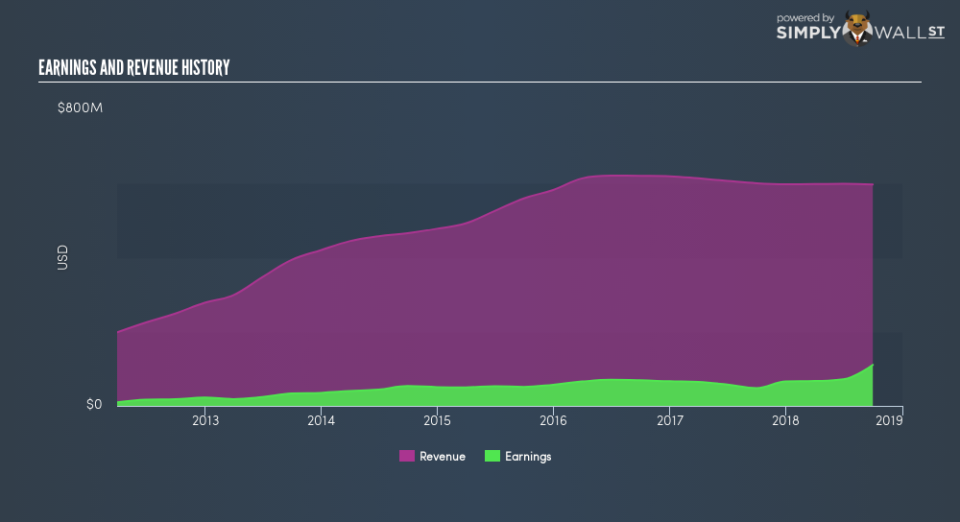Does Chesapeake Lodging Trust (NYSE:CHSP) Have A High Beta?

If you’re interested in Chesapeake Lodging Trust (NYSE:CHSP), then you might want to consider its beta (a measure of share price volatility) in order to understand how the stock could impact your portfolio. Volatility is considered to be a measure of risk in modern finance theory. Investors may think of volatility as falling into two main categories. First, we have company specific volatility, which is the price gyrations of an individual stock. Holding at least 8 stocks can reduce this kind of risk across a portfolio. The other type, which cannot be diversified away, is the volatility of the entire market. Every stock in the market is exposed to this volatility, which is linked to the fact that stocks prices are correlated in an efficient market.
Some stocks see their prices move in concert with the market. Others tend towards stronger, gentler or unrelated price movements. Beta is a widely used metric to measure a stock’s exposure to market risk (volatility). Before we go on, it’s worth noting that Warren Buffett pointed out in his 2014 letter to shareholders that ‘volatility is far from synonymous with risk.’ Having said that, beta can still be rather useful. The first thing to understand about beta is that the beta of the overall market is one. A stock with a beta below one is either less volatile than the market, or more volatile but not corellated with the overall market. In comparison a stock with a beta of over one tends to be move in a similar direction to the market in the long term, but with greater changes in price.
View our latest analysis for Chesapeake Lodging Trust
Want to help shape the future of investing tools and platforms? Take the survey and be part of one of the most advanced studies of stock market investors to date.
What CHSP’s beta value tells investors
As it happens, Chesapeake Lodging Trust has a five year beta of 0.97. This is fairly close to 1, so the stock has historically shown a somewhat similar level of volatility as the market. While history does not always repeat, this may indicate that the stock price will continue to be exposed to market risk, albeit not overly so. Share price volatility is well worth considering, but most long term investors consider the history of revenue and earnings growth to be more important. Take a look at how Chesapeake Lodging Trust fares in that regard, below.
Could CHSP’s size cause it to be more volatile?
With a market capitalisation of US$1.5b, Chesapeake Lodging Trust is a small cap stock. However, it is big enough to catch the attention of professional investors. Small companies often have a high beta value because the stock price can move on relatively low capital flows. So it’s interesting to note that this stock historically has a beta value quite close to one.
What this means for you:
Chesapeake Lodging Trust has a beta value quite close to that of the overall market. That doesn’t tell us much on its own, so it is probably worth considering whether the company is growing, if you’re looking for stocks that will go up more than the overall market. In order to fully understand whether CHSP is a good investment for you, we also need to consider important company-specific fundamentals such as Chesapeake Lodging Trust’s financial health and performance track record. I highly recommend you dive deeper by considering the following:
Future Outlook: What are well-informed industry analysts predicting for CHSP’s future growth? Take a look at our free research report of analyst consensus for CHSP’s outlook.
Past Track Record: Has CHSP been consistently performing well irrespective of the ups and downs in the market? Go into more detail in the past performance analysis and take a look at the free visual representations of CHSP’s historicals for more clarity.
Other Interesting Stocks: It’s worth checking to see how CHSP measures up against other companies on valuation. You could start with this free list of prospective options.
To help readers see past the short term volatility of the financial market, we aim to bring you a long-term focused research analysis purely driven by fundamental data. Note that our analysis does not factor in the latest price-sensitive company announcements.
The author is an independent contributor and at the time of publication had no position in the stocks mentioned. For errors that warrant correction please contact the editor at editorial-team@simplywallst.com.

